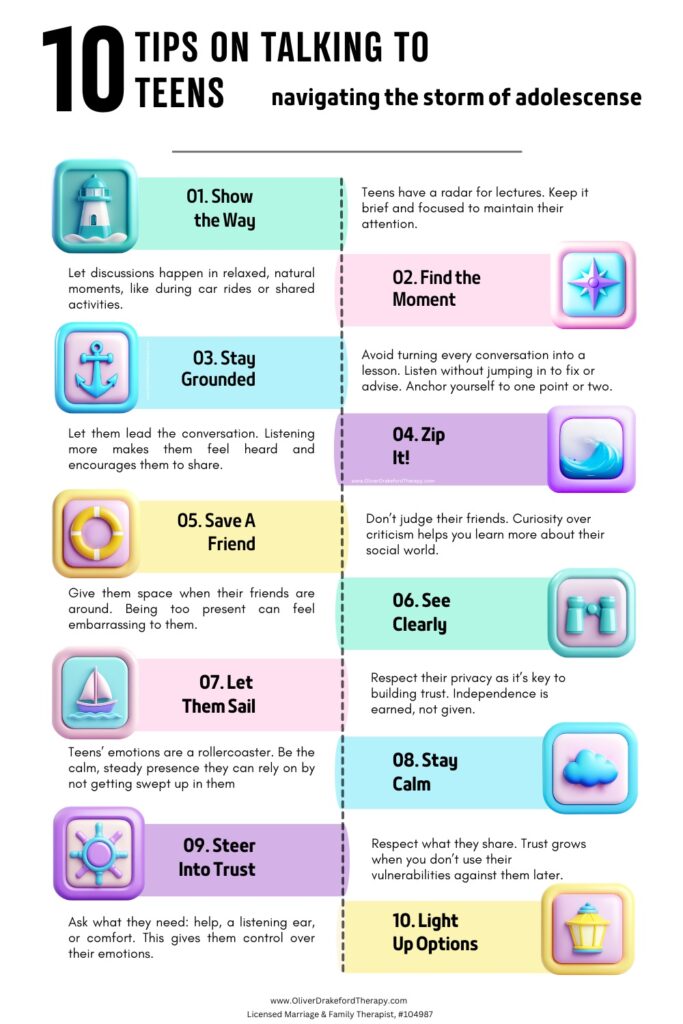Table of Contents
Parenting a teenager can feel like navigating a minefield, especially when your once-chatty child suddenly becomes a master of one-word answers and closed doors. As a parent, you might find yourself wondering what happened to the kid who used to share every detail of their day. The good news is that this behavior is normal, and there are ways to reconnect with your teen. This article will explore strategies to help you bridge the communication gap and strengthen your relationship with your teenager.
The importance of open communication between parents and teens cannot be overstated. Counseling for teens often reveals that many issues stem from breakdowns in family communication. By understanding the reasons behind your teen’s silence and learning effective ways to encourage dialogue, you can create a supportive environment that fosters trust and openness.
Understanding the Silent Treatment
Why Teens Clam Up
Teenagers often withdraw for various reasons. It’s crucial to remember that this behavior usually isn’t personal. Some common factors include:
- Seeking independence
- Fear of judgment or criticism
- Hormonal changes affecting mood
- Stress from school or social pressures
- Desire for privacy
Understanding these underlying causes can help you approach the situation with empathy and patience.
The Impact of Technology
In today’s digital age, technology plays a significant role in teen communication. While it can be a tool for connection, it can also create barriers:
- Teens may prefer texting friends over talking to parents
- Social media can consume their attention
- Online interactions might feel safer than face-to-face conversations
Recognizing the influence of technology can help you adapt your communication strategies accordingly.

Creating a Safe Space for Dialogue
Setting the Right Tone
The way you approach your teen can make all the difference. Creating an environment where they feel safe to open up is crucial:
- Use a calm, non-judgmental tone
- Show genuine interest in their thoughts and feelings
- Avoid interrupting or jumping to conclusions
- Practice active listening
By consistently demonstrating that you’re a safe person to talk to, you increase the chances of your teen opening up over time.
Timing Is Everything
Picking the right moment to initiate conversation can significantly impact its success:
- Avoid trying to talk when your teen is stressed or tired
- Look for natural opportunities, like car rides or shared activities
- Respect their need for space and try again later if they’re not receptive
Remember, forcing conversation rarely yields positive results. Patience and persistence are key.
Effective Communication Techniques
Ask Open-Ended Questions
Instead of questions that can be answered with a simple “yes” or “no,” try open-ended questions that encourage elaboration:
- “What was the best part of your day?”
- “How do you feel about…?”
- “What do you think about…?”
These types of questions show that you’re interested in their thoughts and opinions, not just facts.
Share Your Own Experiences
Opening up about your own life can encourage your teen to do the same:
- Talk about your day and the challenges you faced
- Share stories from your own teenage years
- Be honest about your feelings and vulnerabilities
This approach helps normalize the act of sharing and can make your teen feel more comfortable opening up to you.
Addressing Sensitive Topics
Approaching Difficult Conversations
Some topics are particularly challenging to discuss with teens. Whether it’s about grades, relationships, or risky behaviors, these conversations require extra care:
- Start with a non-threatening opener
- Use “I” statements to express your concerns
- Avoid accusatory language
- Be prepared to listen more than you speak
Remember, the goal is to understand and support your teen, not to lecture or punish.
When to Seek Professional Help
Sometimes, despite your best efforts, you might need additional support. Counseling for teens can be beneficial when:
- Communication breakdowns persist
- You notice significant changes in behavior or mood
- Your teen expresses thoughts of self-harm or depression
- Family conflicts become unmanageable
Professional counselors can provide tools and strategies to improve family communication and address underlying issues.
Building Trust and Respect
Honoring Privacy and Independence
As teens grow, their need for privacy and independence increases. Respecting these needs can actually improve communication:
- Knock before entering their room
- Ask before going through their belongings
- Allow them to make age-appropriate decisions
- Avoid oversharing their personal information with others
Demonstrating respect for their boundaries shows that you trust them, which can encourage them to trust you in return.
Following Through on Promises
Consistency is key in building trust. When you make promises or set rules:
- Be clear about expectations
- Follow through on consequences (both positive and negative)
- Admit when you’re wrong and apologize when necessary
- Be reliable and punctual
Your actions speak louder than words. Showing that you’re trustworthy encourages your teen to be the same.
Connecting Through Shared Activities
Finding Common Ground
Engaging in activities together can create natural opportunities for conversation:
- Cook a meal together
- Watch a movie or TV show
- Play sports or video games
- Work on a home project
These shared experiences can lead to discussions about likes, dislikes, values, and more.
Creating New Traditions
Establishing regular family activities can provide consistent opportunities for connection:
- Weekly game nights
- Monthly outings to new places
- Annual family vacations
- Holiday traditions that involve teen input
These traditions can become cherished times for open communication and bonding.
Navigating the Digital Landscape
Understanding Their Online World
To connect with your teen, it’s important to understand their digital environment:
- Learn about the apps and platforms they use
- Discuss online safety without being judgmental
- Show interest in their online activities and friends
By demonstrating an understanding of their digital life, you open doors to meaningful conversations about their online experiences.
Setting Healthy Boundaries
While it’s important to respect your teen’s digital privacy, it’s also crucial to set boundaries:
- Establish tech-free times for the whole family
- Create a family media agreement
- Discuss the importance of balance between online and offline activities
These boundaries can help create more opportunities for face-to-face interaction and communication.
Encouraging Emotional Intelligence
Teaching Self-Awareness
Help your teen develop emotional intelligence by encouraging self-reflection:
- Ask how certain situations make them feel
- Discuss the physical sensations associated with emotions
- Encourage journaling or artistic expression
By helping them understand their own emotions, you’re equipping them with valuable life skills and opening channels for deeper communication.
Modeling Emotional Regulation
Your own behavior sets a powerful example:
- Demonstrate healthy ways to manage stress and anger
- Talk through your own emotional processes
- Apologize and make amends when you lose your cool
Seeing you navigate emotions in a healthy way can inspire your teen to do the same and feel more comfortable discussing their feelings with you.
The Power of Non-Verbal Communication
Reading Between the Lines
Sometimes, what teens don’t say is just as important as what they do say:
- Pay attention to body language and facial expressions
- Notice changes in routine or habits
- Be aware of the tone and volume of their voice
These non-verbal cues can provide valuable insights into your teen’s emotional state and potentially open doors for conversation.
Using Touch and Presence
Physical connection can be powerful, even with teens who seem to shun affection:
- A gentle touch on the shoulder
- Sitting together in comfortable silence
- Offering a hug (but respecting if they decline)
Sometimes, just being present without words can create a sense of connection and support.
Celebrating Individuality and Growth
Acknowledging Their Unique Journey
Every teen’s path is different. Recognizing and celebrating their individuality can strengthen your bond:
- Praise their efforts and progress, not just achievements
- Show interest in their passions, even if you don’t share them
- Avoid comparing them to siblings or peers
By affirming their unique qualities, you create an environment where they feel valued and understood.
Embracing Change and Letting Go
As your teen grows, your relationship will evolve:
- Be open to seeing your child in new ways
- Allow them to make (and learn from) mistakes
- Gradually increase their responsibilities and freedoms
This process of letting go, while maintaining a supportive presence, is crucial for healthy development and ongoing communication.
Key Takeaways on improving communication with teenagers:
- Create a safe, non-judgmental space for dialogue: Teens are more likely to open up when they feel safe from criticism or punishment.
- Timing matters: Choose appropriate moments for conversations, respecting your teen’s mood and energy levels.
- Use open-ended questions: Encourage deeper conversations by asking questions that require more than yes/no answers.
- Respect privacy and independence: Showing trust in your teen’s boundaries can actually improve communication over time.
- Engage in shared activities: Find common interests or create new traditions to foster natural opportunities for conversation.
- Understand and navigate the digital landscape: Show interest in your teen’s online world while setting healthy boundaries.
- Be aware of non-verbal cues: Pay attention to body language, tone, and behavioral changes as they often communicate more than words.
The Journey of Connection
Building and maintaining open communication with your teenager is an ongoing process that requires patience, understanding, and flexibility. Remember that every small interaction is an opportunity to strengthen your bond. By creating a safe, respectful environment, actively listening, and showing genuine interest in your teen’s life, you lay the foundation for a relationship that can weather the storms of adolescence.
If you find yourself struggling, don’t hesitate to seek support. Counseling for teens and family therapy can provide valuable tools and insights to improve communication and strengthen family relationships. With persistence and love, you can break through the silence and foster a deep, lasting connection with your teenager that will serve you both well into the future.
How can I get my teenager to open up to me?
Creating a safe, non-judgmental environment is key to encouraging your teen to open up. Show genuine interest in their life without prying, and practice active listening when they do share. Be patient and consistent in your efforts to connect. Choose appropriate times for conversations, such as during shared activities or car rides. Remember, building trust takes time, so maintain a calm and supportive presence even when faced with silence.
What should I do if my teen refuses to talk about sensitive topics?
Approach sensitive topics carefully and indirectly. Start with less threatening conversations to build trust. Share your own experiences and vulnerabilities to normalize discussing difficult subjects. If your teen remains resistant, consider suggesting professional counseling as a neutral space to explore these topics. Respect their boundaries while expressing your concerns, and be prepared to listen more than you speak when they do open up.
How can I balance respecting my teen’s privacy with staying involved in their life?
Striking a balance between privacy and involvement requires clear communication and mutual respect. Establish reasonable boundaries together, such as knocking before entering their room or discussing online safety without being intrusive. Show interest in their activities and friends without demanding constant updates. Trust your teen with age-appropriate independence, but maintain open lines of communication for when they need support or guidance.






